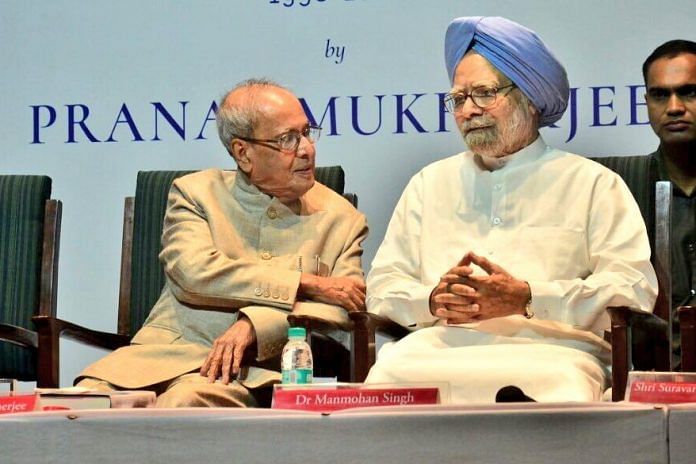Much has been speculated and written about the relationship between former President Pranab Mukherjee and former prime minister Manmohan Singh. Mukherjee was finance minister under prime minister Indira Gandhi when Singh was appointed RBI governor in 1982 but went on to serve as a minister in Singh’s cabinet when the latter headed the UPA government.
The two are supposed to have differed on economic policy and Mukherjee is also thought to have felt aggrieved that Congress chief Sonia Gandhi picked Singh over him to head the UPA government. Mukherjee, in what is perhaps his most candid articulation of views on Singh, opens up about the former PM in his latest book ‘The Coalition Years (1996 – 2012)’ – published by Rupa Publications and released on 13 October.
Edited Excerpts:
Manmohan not accidental PM, transformed economic landscape as FM
A strong nationalist, a man of courage and conviction, Manmohan Singh was certainly not an ‘accidental prime minister’. I am convinced that the future will judge Manmohan Singh in a different light as P.V. is assessed today.
For his role in the 1991 economic liberalization, Singh can rightly be called the ‘father of reforms’. At a time when the country was on the verge of default, he took on the challenge and initiated strong correctives. With the clear mandate from Prime Minister P.V. Narasimha Rao, Singh started the dramatic restructuring process. With an able team in place, he virtually abolished industrial licensing through industrial and trade policy reforms; opened up the private sector while also reducing the obstacles to foreign investment; liberalized interest and exchange rates, and cut tariffs and taxes. In an instant, the economic landscape was transformed, laying the groundwork for an economically sound India in an increasingly globalized world.
Highlight of his tenure was India-US nuclear deal
It was with this legacy and in-depth experience that he became prime minister. Notwithstanding the debate regarding his appointment as prime minister, there could have been no one more experienced in economic policymaking than Manmohan Singh. An apolitical person, he held national interest above all else, had the courage to stand firm on his convictions, and was able to build consensus when needed through his persuasive nature.
Also read: Chidambaram’s ‘dream budget’ did not remain so: Pranab Mukherjee
His tenure marked significant achievements which I have detailed in subsequent chapters, but the highlight would be the firmness with which he handled the Indo–US nuclear deal. As he himself said later:
[The] best moment for me was when we were able to strike a nuclear deal with the United States to end the nuclear apartheid which had sought to stifle the processes of social and economic change and technical progress of our country in many ways.
I got maximum autonomy under PM Manmohan Singh
It was with tenaciousness that Manmohan Singh handled the stiff opposition from the Left, one of the government’s coalition partners, lending support from outside. Singh firmly refused to go back on the international commitment even when faced with a No-confidence Motion on the Indo–US nuclear deal as a result of the Left’s withdrawal of support. He was steadfast and won the confidence motion.
Manmohan Singh had to manage a diverse coalition, and this required skills that not many can boast of—particularly when faced with a few adversarial partners. He did this with aplomb, and empowered his senior ministerial colleagues to do their jobs. I say this out of personal experience, of the prime ministers I have worked with—Indira Gandhi and Narasimha Rao—I got the maximum autonomy when I worked with Manmohan Singh.
History will be kind to Manmohan Singh
History will be kind to Manmohan Singh. It will remember him as the finance minister who launched India’s economic reforms in 1991, and the Prime Minister who presided over 8.5% GDP growth for most of a decade.




The world will remember him as the only highly educated Sikh who was spineless and who became a mute spectator when the mother India was looted left n right
Excellent analysis by the politically wisest. The man of extraordinary caliber is candidly recounted here as father of reforms. The himalayan recognition makes the narration attractive.
A leader at top irrespective of his Party always worked in the interest of Nation as an Executive Head of Govt.
I miss that grace and thin smile and those bespectacled eyes, dim, full of learning. We have now a loud speaker ,talking too much,who only knows how to make people clap at his comments full of third grade wisdom.
You also have to admit that he led one of the most corrupt regime post independence.
A gracious tribute. For reasons that remain unclear, Dr Singh did not pursue economic reforms as PM, perhaps content with the surge of high growth in the exuberant years leading up to 2008. As for granting autonomy to the FM, perhaps greater control ought to have been exercised at a time when India was grappling with the global financial crisis. A bout of double digit inflation, high fiscal deficits, large loans that turned sour, the seeds of some of the problems we continue to face were sown during that time.
How can history be kind to Maunmohan chingh.
This man has through his puppet stance given us MODI!!!!!!!